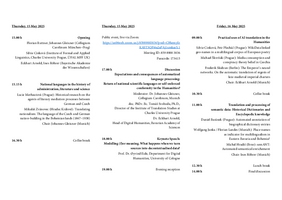(Flyer)
17.00 h: Discussion: Expectations and consequences of automatized language processing: Return of national scientific languages or self-enforced conformity in the Humanities?
Chair: Dr. Johannes Gleixner, Collegium Carolinum
doc. PhDr. Bc. Tomáš Svoboda, Ph.D., Director of the Institute of Translation Studies at Charles University Prague
Dr. Eckhart Arnold, Head of division of Digital Humanities, Bavarian Academy of Science
18.00 h: Keynote Speech: Modelling (f)or meaning. What happens when we turn sources into decontextualised data?
Prof. Dr. Øyvind Eide, Department for Digital Humanities, University of Cologne
The availability of AI-driven translation technology is changing the way the humanities work. Textual sources in different languages, whether scholarly literature or primary sources, have become not only widely available through digitization, but also accessible through automated translation. At the same time, familiar challenges remain, such as the problem of meaning and interpretation in historical contexts.
This raises the question of how to deal with large numbers of translated source texts in scholarly practice. Furthermore, what can we learn from the historical-political conditions for the standardization of (scientific) languages as well as from the history of translation, especially in the Central European context?
Anyone interested is welcome to attend and take part in discussion. There will be a short reception afterwards.
The discussion and the keynote speech are the public part of the workshop: Automated context? Practices, opportunities and risks of AI-driven translation in Bohemistics and the Humanities (program).
Please register under florian.ruttner@collegium-carolinum.de
Organized by: Collegium Carolinum Munich – Prague; Institute for Applied and Formalized Linguistics, Charles University Prague; Digital Humanities Munich, Bavarian Academy of Sciences
Supported by Deutsch-Tschechischer Zukunftsfond

